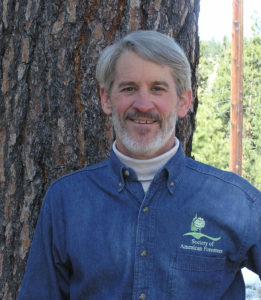
We live in a time of historically low trust and confidence in our institutions, whether they be banks, big business, the federal government, police, the media, science or religion. It doesn’t seem to be skepticism, but a more deeply rooted cynicism.
There’s a danger in such deep-seated cynicism. Democracy as a form of government requires an underlying trust in institutions, the rule of law and its enforcement. Now, the idea that we are all Americans who hold the Declaration of Independence and the Constitution as the core organizing principles upon which we base our allegiances is under attack from within and outside our borders.
The notion that we will battle in elections, but then come together and govern for the good of the whole has severely eroded. I worry about the future for my children and grandchildren. I ask myself how do we break this negative, downward cycle. What can I do as an individual? What can Treesource do to strengthen our democratic behavior?
Last week, I attended the North American Forest Partnership meeting in Portland, Oregon. It was a breath of fresh air compared to what I hear most often in the news media about the state of our body politic.
The NAFP is a partnership of 110-plus businesses and organizations, including wood manufacturers (lumber, furniture, paper, energy), landowners large (corporations and NGOs) and small (family forests, the American Forest Foundation), and public land managers (U.S. Forest Service, local and state), as well as a variety of interest-based organizations like the National Wildlife Federation, New Jersey Audubon Society, American Forests, The Nature Conservancy and the National Wild Turkey Federation.
What felt so refreshing in those meeting rooms was not a unanimity of opinion among all these groups; rather, it was the fact that they came together to find and share common ground around a belief in the value and importance of forests.
As I talked with attendees, it was clear they came from all across the political spectrum, but they didn’t use that to divide themselves. Rather, these folks were united by a common interest and passion for forests and the essential values they provide our society. It gave me hope that democracy still exists and can work.
A new video was released to the audience of 160-plus about the diverse ways in which forests make our lives better. These groups have very different goals that drive their organizations and businesses. Some are focused on recreation opportunities, others wildlife habitat, others on wood products, and many forest owners have a blend of these goals.
Yet, they all recognize the importance of keeping forests as forests rather than urban development or conversion to agriculture. They all realize we need a variety of different forests that give us the variety of different goods and services we want and need.
The “fresh air” was reflected in presentations and discussions that explored how best to develop relationships based on trust and integrity. Participants included voices from outside as well as inside the forest community.
They talked about the importance of NOT trying to avoid the hard issues, but rather the need to engage with adversaries to really understand their perspective, explain your perspective and find common interests, if possible. And where common ground is not possible, attendees sought to provide important perspective and context for why certain types of forest management are important and useful – even while there may be trade-offs from other perspectives. In an era of information overload, we learned about how to break through the noise.
I have spent 40-plus years working in the forest community and have watched it rip and tear itself apart in the legislative process, the media and the court system. People became entrenched in their positions through those earlier decades, oftentimes for good reason as society struggled to change how our forests were managed.
Over the past 10 to 20 years, a few individuals and organizations tired of the battle and lack of progress in providing healthy, resilient forests and communities and called a truce.
I had the privilege to moderate a panel on collaborative forestry that shared experiences where folks said, let’s see if there isn’t a better way to move forward. We heard about communities coming together to find common interests and build solutions based on those shared values. They built trust, solid working relationships, and in many cases friendships – or at least respect.
These local efforts and their success give me hope that democracy can be reinvigorated, and that as an individual I can engage in this process. Treesource can help by sharing examples of the communities that use democratic ideals to form a more perfect forest landscape.
Treesource is planning a series of stories about communities and regions across this wonderful country highlighting how people can come together to create solutions for the forest, communities and economies. Maybe we can show our national politicians how democracy is supposed to work.

Very well said Dave. Looking forward to your follow up articles.
Great to hear you see folks coming together!! It can be discouraging at times – I hope 2018 will bring more positive meetings and folks talk to one another not at one another!!🔜🔜👍👍
Bob Williams CF
Awesome job Dave. Great to hear about groups working together. Forest Health is so critical for our future. NAFP is a great group
Dave – Like your re-cap. Was a good meeting. I sent you brand new videos we produced that you might want to post. Never heard back from you.
Best.
Charlie Levesque
Dave, once again you have brought necessary light into a darkening room. I am elated that this type of discussion took place, at the conference, and I look forward to the continu dialogue that Treesource will facilitate.